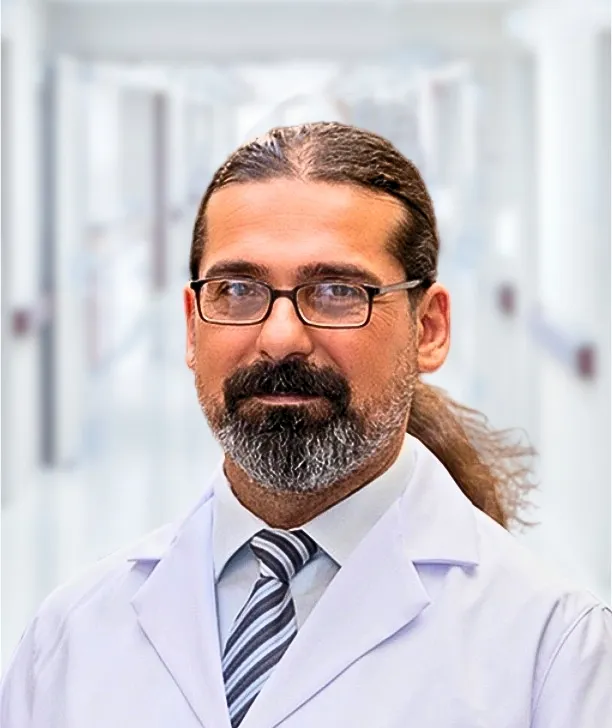- 0+ Robotic Surgery
- 0+ Prostate Cancer
- 0+ Laser Surgery
- 0+ Stone Care
Prof. Dr. Yılmaz Urology Specialist
Prof. Dr. Yılmaz is a renowned urology specialist with advanced expertise in urological cancers, robotic surgery, laser prostate enucleation, and endoscopic stone treatments. He graduated from Çukurova University Faculty of Medicine in 1999 and completed his urology residency at Ankara Numune Training and Research Hospital in 2005.
Throughout his career, he has served at prestigious institutions, performing thousands of successful surgeries using cutting-edge technologies. His clinical focus includes robotic and laparoscopic procedures for prostate, bladder, and kidney cancers, as well as advanced techniques in urinary stone management.
In addition to his surgical excellence, Prof. Dr. Yılmaz has participated in international medical missions in Yemen, Somalia, and Afghanistan, providing expert care under challenging conditions. Known for his patient-centered approach and commitment to medical innovation, he continues to deliver personalized treatment plans with outstanding outcomes.
Specialized Procedures
Professional Experience
-
Medical Degree (MD) | (1999)
Çukurova University Faculty of Medicine -
Urology Residency Training | (Completed in 2005)
Ankara Numune Training and Research Hospital -
Urology Specialist
– Robotic and laparoscopic surgery for prostate, bladder, and kidney cancers
– Laser prostate enucleation and endoscopic stone treatments -
International Medical Missions
Yemen, Somalia, Afghanistan -
Professor of Urology | (Present)
Performing advanced urological cancer surgeries using cutting-edge technologies
Prof. Dr. Yılmaz Before & After Gallery






Hotel Accommodation Gallery







Hospital & Clinic Facility Gallery







Prof. Dr. Yılmaz Video Gallery
Patient Testimonials
International Patient Reviews for Specialist in Urology and Genitourinary Disorders in Istanbul
Frequently Asked Questions
Advanced urological cancer surgery (prostate, kidney, bladder), robotic & laparoscopic surgery, HoLEP laser enucleation for BPH, stone surgery (RIRS/PCNL), endoscopic procedures, and MRI-fusion prostate biopsy. Experience: 2500+ robotic surgeries, 2000+ prostate cancer cases, 1500+ laser surgeries, 60+ complex stone care.
Anyone with elevated PSA, urinary symptoms (weak stream, frequency, night urination), blood in urine, kidney/ureteral stones, a renal mass on imaging, recurrent UTIs, or post-prostate cancer follow-up.
Robotic offers 3D magnified vision and wristed instruments for precise, nerve-sparing cancer surgery with smaller incisions and quicker recovery. Laparoscopic is also minimally invasive; open is reserved for select complex cases.
Active surveillance (low-risk), robotic radical prostatectomy, or radiotherapy (with/without hormone therapy). The choice depends on Gleason grade, PSA, MRI stage, age, and personal priorities (continence/potency).
Often yes—if cancer location allows. Bilateral or unilateral nerve-sparing helps preserve erections and continence, supported by early pelvic-floor rehab and medication when appropriate.
Mild symptoms may respond to pills. For large glands or drug side-effects, HoLEP laser enucleation removes obstructing tissue completely with low bleeding risk and durable results; TURP is another option for moderate sizes.
Most patients are discharged same/next day, catheter off within 24 hours, and return to normal activities in 3–5 days (avoid heavy lifting and cycling for ~2 weeks).
Small tumors often suit nephron-sparing (partial) nephrectomy—frequently robotic/laparoscopic—to preserve kidney function. Larger or complex masses may require radical removal. Decision is imaging-based.
RIRS (flexible ureteroscopy) for many ureter/renal stones; PCNL for large staghorn stones; ESWL for select small stones. Stone analysis and prevention plan are included.
Robotic prostatectomy/partial nephrectomy: hospital 1–2 nights, plan 7–10 days total.
HoLEP: 1–3 days total stay.
RIRS/ESWL: 2–3 days.
Individual cases may vary.
HoLEP: 1–3 days total stay.
RIRS/ESWL: 2–3 days.
Individual cases may vary.
 English
English
 Spanish
Spanish  Russian
Russian  Portuguese
Portuguese  Italian
Italian  Polish
Polish 

